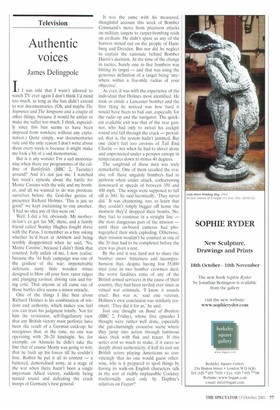Authentic voices
James Delingpole
If I was told that I wasn't allowed to watch TV ever again I don't think I'd mind too much, as long as the ban didn't extend to war documentaries. (Oh, and maybe The Sopranos and The Simpsons and a couple of other things, because it would be unfair to make me suffer too much, I think, especially since this ban seems to have been imposed from nowhere without any explanation.) Quite simply, war documentaries rule and the only reason I don't write about them every week is because it might make me look a bit of a sad monomaniac.
But is it any wonder I'm a sad monomaniac when there are programmes of the calibre of Battlefields (BBC 2, Tuesday) around? And it's not just me. I watched last week's episode about the battle for Monte Cassino with the wife and my brother, and all we wanted to do was prostrate ourselves before the God-like genius of presenter Richard Holmes. 'This is just so good!' we kept exclaiming to one another. 'I had no idea any of this went on.'
Well. I did a bit, obviously. My motherin-law's ex got his MC there, and a family friend called Stanley Hughes fought there with the Paras. I remember as a boy asking whether he'd been at Arnhem and being terribly disappointed when he said, 'No, Monte Cassino', because I didn't think that counted. Jolly unfair of me, I now realise, because the '44 Italy campaign was one of the grisliest of the war: impenetrable defences; nasty little wooden mines designed to blow off your foot; razor ridges and plunging ravines; driving rain and biting cold. That anyone at all came out of those battles alive seems a minor miracle.
One of the things I like best about Richard Holmes is his combination of wisdom and authority, which makes you feel you can trust his judgment totally. Not for him the revisionist, self-flagellatory view that any British victory must perforce have been the result of a German cock-up: he recognises that, at the time, no one was operating with 20-20 hindsight. So, for example, on Alamein he didn't take the line that of course Monty was going to win; that he built up his forces till he couldn't lose. Rather he put it all in context — a battered, demoralised army, at a stage of the war when there hadn't been a single important Allied victory, suddenly being turned round and defeating the crack troops of Germany's best general. It was the same with his measured, thoughtful account this week of Bomber Command's move from precision attacks on military targets to carpet-bombing raids on civilians. He didn't spare us any of the horrors meted out on the people of Hamburg and Dresden. But nor did he neglect to explain the rationale behind Bomber Harris's decision. At the time of the change in tactics, barely one in five bombers was hitting its target — and that was using the generous definition of a target being 'anywhere within a five-mile radius of your objective'.
As ever, it was with the experience of the individual that Holmes most identified. He took us inside a Lancaster bomber and the first thing he noticed was how hard it would have been to bail out, especially for the radio op and the navigator. The quickest available exit was that of the rear gunner, who had only to swivel his cockpit round and fall through the crack — provided, that is, the system hadn't jammed. But one didn't feel too envious of Tail End Charlie — not when he had to shiver alone and unprotected under a perspex canopy in temperatures down to minus 40 degrees.
The sangfroid of these men was truly remarkable. One of them recalled the evasive roll these ungainly bombers had to perform when under attack, corkscrewing downward at speeds of between 350 and 400 mph. 'The wings were supposed to fall off at 300,' he said laconically. They never did. It was chastening, too, to learn that they couldn't simply bugger off home the moment they'd dropped their bombs. No, they had to continue in a straight line — the most dangerous part of the mission — until their on-board cameras had photographed their stick exploding. Otherwise, their mission wouldn't be counted as one of the 30 that had to be completed before the crew was given a rest.
By the end it was hard not to share the bomber crews' bitterness and incomprehension that, despite having lost 55,000 men (one in two bomber crewmen died: the worst fatalities ratio of any of the British armed services) in the cause of their country, they had been reviled ever since as virtual war criminals. 'I know it sounds cruel. But war is,' said one veteran. Holmes's own conclusion was similarly resonant. 'They did it for us,' he said.
Just one thought on Band of Brothers (BBC 2, Friday), whose first episodes I thought were rather well done, especially the gut-churningly evocative scene where they jump into action through luminous skies thick with flak and tracer. If this series cost so much to make, if it cares so deeply about authenticity. if half its cast are British actors playing Americans so convincingly that no one would guess otherwise, why is it prepared to spoil things by having its walk-on English characters talk in the sort of risibly implausible Cockney traditionally used only by Daphne's relatives on Frazier?


























































































 Previous page
Previous page